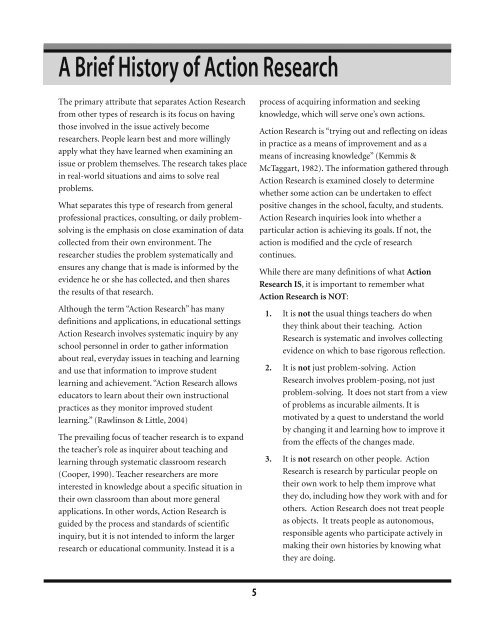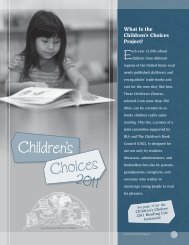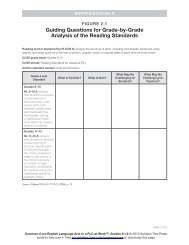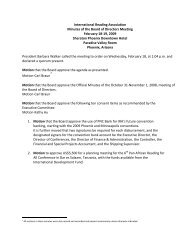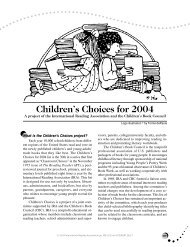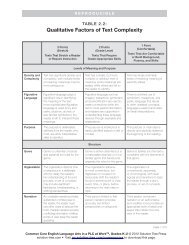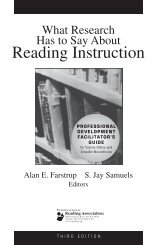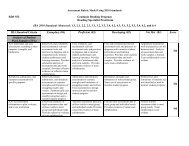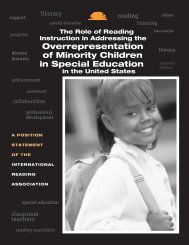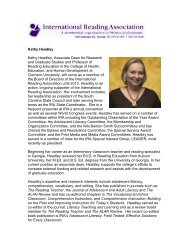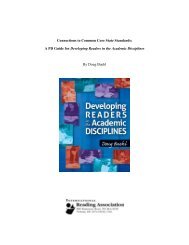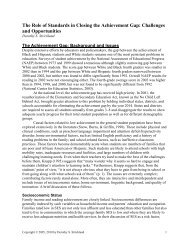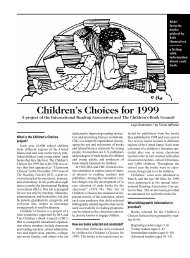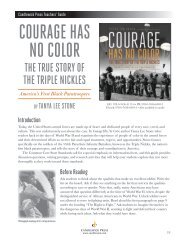A Practical Guide to Action Research for Literacy Educators
A Practical Guide to Action Research for Literacy Educators
A Practical Guide to Action Research for Literacy Educators
You also want an ePaper? Increase the reach of your titles
YUMPU automatically turns print PDFs into web optimized ePapers that Google loves.
A Brief His<strong>to</strong>ry of <strong>Action</strong> <strong>Research</strong><br />
The primary attribute that separates <strong>Action</strong> <strong>Research</strong><br />
from other types of research is its focus on having<br />
those involved in the issue actively become<br />
researchers. People learn best and more willingly<br />
apply what they have learned when examining an<br />
issue or problem themselves. The research takes place<br />
in real-world situations and aims <strong>to</strong> solve real<br />
problems.<br />
What separates this type of research from general<br />
professional practices, consulting, or daily problemsolving<br />
is the emphasis on close examination of data<br />
collected from their own environment. The<br />
researcher studies the problem systematically and<br />
ensures any change that is made is in<strong>for</strong>med by the<br />
evidence he or she has collected, and then shares<br />
the results of that research.<br />
Although the term “<strong>Action</strong> <strong>Research</strong>” has many<br />
definitions and applications, in educational settings<br />
<strong>Action</strong> <strong>Research</strong> involves systematic inquiry by any<br />
school personnel in order <strong>to</strong> gather in<strong>for</strong>mation<br />
about real, everyday issues in teaching and learning<br />
and use that in<strong>for</strong>mation <strong>to</strong> improve student<br />
learning and achievement. “<strong>Action</strong> <strong>Research</strong> allows<br />
educa<strong>to</strong>rs <strong>to</strong> learn about their own instructional<br />
practices as they moni<strong>to</strong>r improved student<br />
learning.” (Rawlinson & Little, 2004)<br />
The prevailing focus of teacher research is <strong>to</strong> expand<br />
the teacher’s role as inquirer about teaching and<br />
learning through systematic classroom research<br />
(Cooper, 1990). Teacher researchers are more<br />
interested in knowledge about a specific situation in<br />
their own classroom than about more general<br />
applications. In other words, <strong>Action</strong> <strong>Research</strong> is<br />
guided by the process and standards of scientific<br />
inquiry, but it is not intended <strong>to</strong> in<strong>for</strong>m the larger<br />
research or educational community. Instead it is a<br />
process of acquiring in<strong>for</strong>mation and seeking<br />
knowledge, which will serve one’s own actions.<br />
<strong>Action</strong> <strong>Research</strong> is “trying out and reflecting on ideas<br />
in practice as a means of improvement and as a<br />
means of increasing knowledge” (Kemmis &<br />
McTaggart, 1982). The in<strong>for</strong>mation gathered through<br />
<strong>Action</strong> <strong>Research</strong> is examined closely <strong>to</strong> determine<br />
whether some action can be undertaken <strong>to</strong> effect<br />
positive changes in the school, faculty, and students.<br />
<strong>Action</strong> <strong>Research</strong> inquiries look in<strong>to</strong> whether a<br />
particular action is achieving its goals. If not, the<br />
action is modified and the cycle of research<br />
continues.<br />
While there are many definitions of what <strong>Action</strong><br />
<strong>Research</strong> IS, it is important <strong>to</strong> remember what<br />
<strong>Action</strong> <strong>Research</strong> is NOT:<br />
1. It is not the usual things teachers do when<br />
they think about their teaching. <strong>Action</strong><br />
<strong>Research</strong> is systematic and involves collecting<br />
evidence on which <strong>to</strong> base rigorous reflection.<br />
2. It is not just problem-solving. <strong>Action</strong><br />
<strong>Research</strong> involves problem-posing, not just<br />
problem-solving. It does not start from a view<br />
of problems as incurable ailments. It is<br />
motivated by a quest <strong>to</strong> understand the world<br />
by changing it and learning how <strong>to</strong> improve it<br />
from the effects of the changes made.<br />
3. It is not research on other people. <strong>Action</strong><br />
<strong>Research</strong> is research by particular people on<br />
their own work <strong>to</strong> help them improve what<br />
they do, including how they work with and <strong>for</strong><br />
others. <strong>Action</strong> <strong>Research</strong> does not treat people<br />
as objects. It treats people as au<strong>to</strong>nomous,<br />
responsible agents who participate actively in<br />
making their own his<strong>to</strong>ries by knowing what<br />
they are doing.<br />
5


